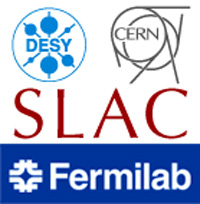
Handy Links
SLAC News Center
SLAC Today
- Subscribe
- Archives: Feb 2006-May 20, 2011
- Archives: May 23, 2011 and later
- Submit Feedback or Story Ideas
- About SLAC Today
SLAC News
Lab News
- Interactions
- Lightsources.org
- ILC NewsLine
- Int'l Science Grid This Week
- Fermilab Today
- Berkeley Lab News
- @brookhaven TODAY
- DOE Pulse
- CERN Courier
- DESY inForm
- US / LHC
SLAC Links
- Emergency
- Safety
- Policy Repository
- Site Entry Form

- Site Maps
- M & O Review
- Computing Status & Calendar
- SLAC Colloquium
- SLACspeak
- SLACspace
- SLAC Logo
- Café Menu
- Flea Market
- Web E-mail
- Marguerite Shuttle
- Discount Commuter Passes
-
Award Reporting Form
- SPIRES
- SciDoc
- Activity Groups
- Library
Stanford
Around the Bay
High-Energy Physics Labs Join to Build New Information System
 The European Organization for Nuclear Research (CERN), the Deutsches Elektronen-Synchrotron (DESY), the Fermi National Accelerator Laboratory (FNAL) and SLAC announced
last week they will join to build INSPIRE, the next-generation high energy
physics information system, which will empower scientists with innovative tools for successful research at the dawn of an era of new discoveries.
The European Organization for Nuclear Research (CERN), the Deutsches Elektronen-Synchrotron (DESY), the Fermi National Accelerator Laboratory (FNAL) and SLAC announced
last week they will join to build INSPIRE, the next-generation high energy
physics information system, which will empower scientists with innovative tools for successful research at the dawn of an era of new discoveries.
The announcement was made at the second annual Summit of Information Specialists in Particle Physics and Astrophysics held at DESY on May 20th and 21st. The summit was attended by representatives from the four laboratories, other information providers, including Cornell's arXiv.org and the SAO/NASA Astrophysics Data System (ADS), and leading publishers.
Addressing the meeting, DESY Research Director and CERN Director-General Elect Rolf-Dieter Heuer endorsed this endeavor by saying, "INSPIRE bears the promise of answering emerging information needs and delivering higher efficiency in science through advanced information discovery. It constitutes an exciting opportunity for experimentation and innovation in partnership with other disciplines and publishers."
Attendees said they are excited by the opportunities for collaboration that the INSPIRE service will bring to the field. "arXiv.org is the central distribution site for new HEP articles," said Simeon Warner, arXiv Manager, Cornell University Library. "The utility of arXiv is enhanced by long-standing close collaboration and interlinking with SPIRES, ADS and publisher websites. We support and look forward to collaboration with INSPIRE to improve the global HEP information network."
"The American Physical Society, with the early recognition of the arXiv and the exchange of rich metadata with SPIRES and ADS, has long recognized the importance of collaborating with the HEP community and will continue to support the information needs of this important field of physics," said Robert Kelly, APS Director Journal Information Systems. His comments were echoed by David Clark, publishing director at Elsevier, who said, "Elsevier has been involved with SPIRES for many years and was delighted to be involved with INSPIRE from the outset. We are glad to contribute to making information better accessible to the HEP community."
The status of HEP information systems was recently analyzed by the libraries of CERN, DESY, Fermilab and SLAC. A subsequent poll revealed that community-based services are overwhelmingly dominant in the research workflow of HEP scholars, whose needs are not met by existing commercial services. The poll found that HEP scientists attach paramount importance to three axes of excellence: access to full-text, depth of coverage and quality of content, possibly extended to connecting fields outside HEP.
Based on these results, the managements of the labs seized the opportunity to build INSPIRE, a community-based and user-driven next-generation information system, fully exploiting a new technological environment. INSPIRE is being built by combining the successful SPIRES database, curated at DESY, Fermilab and SLAC, with the Invenio digital library technology developed at CERN. INSPIRE will offer the functionalities and quality of service which the HEP user community has grown to expect from SPIRES, an indispensable tool in their daily research workflow. It will develop long-sought features, providing access to the entire corpus of the HEP literature with full-text Google-like search capabilities and enabling innovative text- and data-mining applications.
INSPIRE represents a natural evolution of scholarly communication, built on successful community-based information systems, and provides a vision for information management in other fields of science.
—Published in SLAC Today on May 30, 2008. The original DESY press release can be found here.